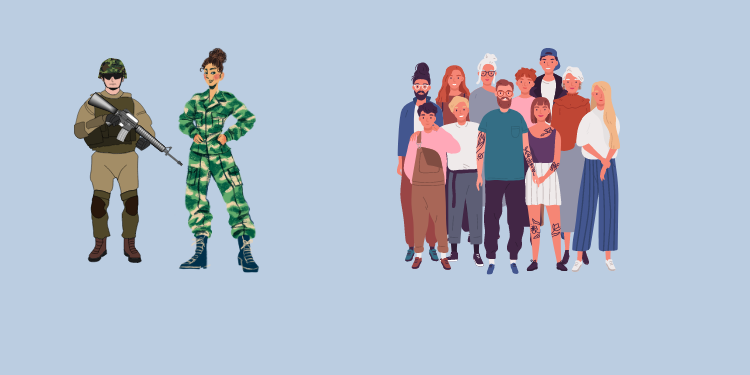The Right of Association in the Armed Forces – Citizen in Uniform
EUROMIL, as the European Organisation of military associations and trade unions is first and foremost aiming at the respect for and the application of human rights and fundamental freedoms in and by the European Armed Forces. EUROMIL’s essential consideration is that a soldier should be treated as a “citizen in uniform” with the same rights and obligations as his fellow citizens. However, by fully understanding the role of the military and the role that soldiers may have to play, restrictions should only be allowed in time of operations and wartime.
However, in practice the right of association for military personnel in Europe has been a peculiar situation depending on the particularities of each country. To provide a few examples, in the Netherlands a military association was founded already in 1898, and several decades later it became a trade union, while in Belgium, the first signs of a military association can be found in the late 19th century. However, a legal basis to transform these associations in trade unions has only been decided in 1978 and it took almost 17 years to execute this legislation. Looking to the Northern part of Europe, we see that all of them – Norway, Sweden, Denmark and Finland – grant full trade union rights to their military personnel. Another example is Ireland where the right of association was denied to military personnel up until 1992 and it took at that time a two-year fight with politicians and the military leadership. Comparable situations are existing for example in France, Portugal, Spain, Italy, Cyprus and Greece where military personnel can join professional associations, however trade union rights, collective bargaining, or joining Trade Union Federations may not be permitted. In other cases as in Bulgaria or Poland military associations may be accepted but have limited competences.
Finally, the situation on the right of association in the German Armed Forces is rather unique. The German Armed Forces Association – the Deutscher Bundeswehr-Verband or DBwV – was founded in 1956. Built on the foundations of the new post-war German armed forces in which democratic conduct and principles such as citizen in uniform were applied, this new association would become a household name in the German armed forces. The fact that the DBwV is viewed as the only representative partner for German military personnel but on the other hand is not part of a trade union federation, creates some national relational problems.
Overall, all workers and therefore also those in uniform, need associations and by preference trade unions to look for improving their terms of employment, to improve their legal position, their salary, their career possibilities, their education, their career planning, their housing, their medical and psychosocial care. At a European level the past decade and especially today many developments concerning the future of European Defence have taken place. Hence, it has become evident that strong military representation through associations or trade unions is needed to organize the social impact of such upheavals; The increase of defence spending, common EU defence projects as the Permanent Structured Cooperation (PESCO), the adoption of the Strategic Compass and the creation of a Rapid Deployment Capacity (RDC) are just a few examples of a changing situation in the European Armed Forces.
In this regard, it is important to note that the European Parliament on its annual Common Security and Defence Policy (CSDP) report 2022 calls – among others- for the protection of the social rights of military personnel that train and work together under an EU framework. Similarly the European Parliament also adopted in April 2023, a Resolution entitled “EU Rapid Deployment Capacity, EU Battlegroups and Article 44 TEU: the way forward”, and it includes a section on gender, social and worker’s rights which underlines that the EU RDC “will be made up of forces that will train and work together and that as long as they are under EU command, the troops assigned to the EU RDC should enjoy equal working and social rights”.
Hence, EUROMIL calls on the European Institutions to take under consideration – especially given the upcoming European Elections in 2024 – that human rights in the Armed Forces need to be fully or correct implemented and it should not be forgotten that soldiers are citizens in uniform with the same rights and freedoms as their fellow citizens. It is also important for the European Parliament to continue advocating for a fairer working environment for military personnel and make sure that the Member States are willing enough to make this happen. In this way, Europe can become more socially inclusive for its Armed Forces.
This article is part of EUROMIL’s European Elections 2024 project.

